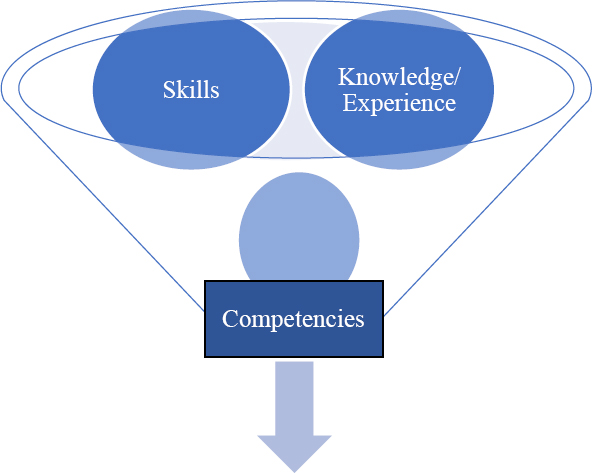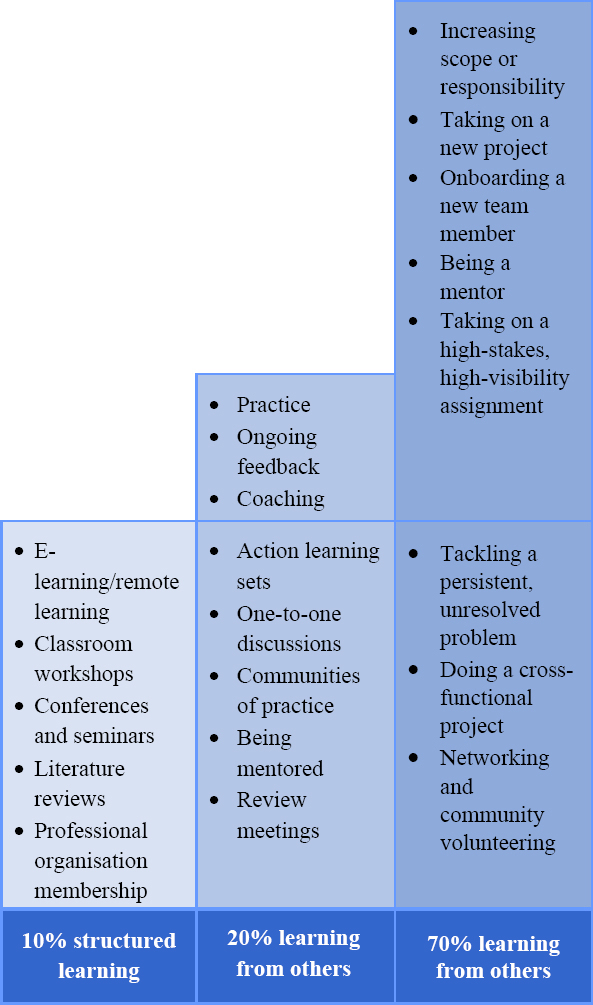CHAPTER 8: SOURCES OF INFORMATION
Whatever route you decide on to further your career, you’ll probably need more information, as well as help from other people to achieve your goals. In this chapter, I’ll help you consider how you may do this.
Identify the gaps
There are many places you can go for help in developing your career. Before you begin, it is important to first identify what you are missing. What are the gaps in your knowledge, skills or experience?
For example, if you want to take on a leadership role, what experience do you have? What skills have you acquired to date? What knowledge do you have of how to become a leader? What are the competencies you may need to develop?
How do you like to learn?
Once you have identified the gaps, consider how you like to learn:
• What are the best ways to increase your knowledge, skills or experience?
• What development training do you feel you may benefit from and why?
• In what specific ways do you think your current role can help prepare you for the future you desire?
• What types of other experiences do you think would help you develop?
• Where or from whom might you best gain that experience?

Figure 4: Identify the gaps
70/20/10 model of learning
It’s helpful also to consider how we learn. The 70/20/10 model states that people obtain 70% of their knowledge from job-related experiences, 20% from social interactions with others, like co-workers and managers, and 10% from formal learning events.
The diagram on the following page illustrates a range of options that can help your development, either as structured learning, learning from others or learning from experience.
Sources of help
There are a wide variety of people you can turn to for help and support.
Family and friends
I recommend speaking to your family and friends about your career aspirations. They can be a useful sounding board and a listening ear. They may also be able to provide you with contacts or know of job openings. Recently a colleague helped her son find a placement via a friend. Another colleague who wanted to change career direction found helpful advice from a friend who worked in her desired field and who she first met at her local gym.

Whether you want to move upwards, sideways or to a different role, develop your personal competencies or become more of a technical expert or a leader, your manager can be a useful source of help and advice. Discuss your career development at your one-to-ones and ask for their support.
A mentor
In chapter 6, I discussed the benefits of mentoring and how to find a mentor. Mentors provide guidance and advice around career development based on their experience.
HR and learning and development
If you find it hard to speak to your manager or believe they are not supporting you in your career aspirations, it can be useful to have a discussion with your HR or learning and development team about the options available. Look out for job posts and development opportunities. Most organisations offer development training and some also provide sponsorship around external qualifications, so it is worth investigating what is on offer within your organisation.
Research experts in the field
If you want to change industry sectors or develop your expertise in your desired field, find out who the thought leaders are and follow the experts. Go online and look for people who are successful in their field, what they have published, their social media posts, etc. This is a helpful way of understanding current issues and future trends. You can also reach out to them for information, as described below.
Industry bodies
Likewise, research what industry bodies or trade associations exist for your area. Most sectors have a professional body or association that provides membership and qualifications and can be a useful source of information, career advice and development. Some larger organisations even have secondment opportunities.
Networking
Actively grow your network. It’s important to expand your connections and develop your professional circle to widen your visibility. The people you network with may not be offering a job, but in connecting with them, you develop your personal brand and can learn from them.
Look out for conferences and seminars you can attend either virtually or face to face. LinkedIn groups where like-minded individuals connect and share information are also a good source of contacts.
When you connect with people, look for opportunities to seek advice. For example, you can ask:
• How do you see the industry growing?
• What qualifications and experience do you see as essential?
• How do you stay up to date with trends?
• Are there any associations or network circles I should join?
Most people are happy and often flattered to be asked for advice. Don’t be shy about reaching out to others. You may suggest an informal chat over coffee or a short online call, email exchange or LinkedIn contact to start the process.
Remember too that networking is a two-way street. You can be a useful source of information for others, so be prepared to give as well as take.
And if you think that networking is not for you, be bold, not passive! A 2016 LinkedIn survey found that 85% of critical jobs are filled via networking of some sort.13
Volunteering and work experience
If you want to know what a job or industry is really like, look for opportunities to get experience, for example via shadowing or interim work.
If you are not able to connect directly with people in your desired industry, look for volunteering opportunities where you can develop your skills. For example, perhaps there is a local not-for-profit organisation that would benefit from volunteers with IT or marketing skills, or where you can practise your leadership skills.
Test-driving a job first, be it directly or indirectly, can help you determine the skills and experience that are required as well as seeing whether you’re making the right career move.
Identify who you need to influence and sources of information
Although you are responsible for your own career development, you will need help and support to achieve your development goals.
To conclude this chapter, I recommend brainstorming to identify the gaps in your career development, how to find information about filling these gaps, who you need to ask for help and how you will do this.
13 Adler, Lou. 29 February 2016. “New Survey Reveals 85% of All Jobs are Filled Via Networking”. www.linkedin.com/pulse/new-surveyreveals-85-all-jobs-filled-via-networking-lou-adler?.
